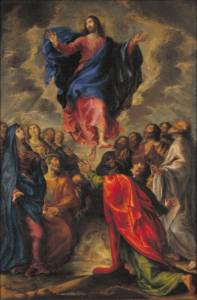Today is Ascension Thursday, although in many places it has been moved to Sunday to allow Catholics a day to complain about the state of the Church.

Excuse me, Lord, there is some debate down here about when you should ascend. Could you hold on while we determine if today or Sunday is best for us?
A lot of people, including me, don’t like the fact that the celebration of the Ascension has been moved from its traditional date 40 days after Easter (when, you know, it actually happened) to the following Sunday. I realize that the intentions behind the move are quite sincere and well-meaning: people were afraid that celebrating the Ascension on a business work day would cause too many people to miss Mass on this important day, and so moving it to Sunday would allow more Catholics to actually celebrate it. But I think this was short-sighted and in the end actually causes more people to miss celebrating the Ascension because they are not going to Mass on either Thursday or Sunday. What do I mean by that?
Making a day like Ascension Thursday a holy day of obligation sets apart Catholics from the rest of the culture. While I do believe that Catholics are to be immersed in society in many ways, we also need to have a strong Catholic identity so that we don’t drown in the prevalent culture. There has always been a thin line balancing our need to be part of the culture yet separate from it. The early Christian Diognetus wrote,
Christians are indistinguishable from other men either by nationality, language or customs. They do not inhabit separate cities of their own, or speak a strange dialect, or follow some outlandish way of life. Their teaching is not based upon reveries inspired by the curiosity of men. Unlike some other people, they champion no purely human doctrine. With regard to dress, food and manner of life in general, they follow the customs of whatever city they happen to be living in, whether it is Greek or foreign
Yet he followed this description with the following:
And yet there is something extraordinary about their lives. They live in their own countries as though they were only passing through. They play their full role as citizens, but labor under all the disabilities of aliens. Any country can be their homeland, but for them their homeland, wherever it may be, is a foreign country. Like others, they marry and have children, but they do not expose them. They share their meals, but not their wives.
In other words, Catholics are to naturally blend into society, but, simply by virtue of following Christ, they will form a Catholic identity which will cause them to sometimes not “fit in” to the greater culture.
And having a specific Catholic identity is a powerful evangelization tool. When a Catholic must rework their schedule on Ascension Thursday to make it to Mass, he sends a message both to those around him and to himself: there is more to this world than work and priming the economical engine. And we see a perfect example of the power of Catholic identity each year on Ash Wednesday: although it is not a holy day of obligation, more Catholics attend Mass that day than some other actual obliged days. I remember my first Ash Wednesday after I began my professional career. I went to Mass early in the morning, so I had my ashes on my forehead for the whole day. Most of the morning, non-Catholics would do double-takes but did not say anything. Catholics in the office, however, would see me and say, “I forgot it was Ash Wednesday! I need to go to Mass at lunchtime!” They were reminded of their Catholic identity and decided to make an effort to stay connected to the Church. Simply going to Mass on a day other than Sunday drew others to do the same.
I think a similar thing would happen on Ascension Thursday. When you tell your co-workers that you have to go to Mass at lunchtime, it sends a signal of your life’s priorities. This opens you up for conversations and inquiries about your Faith, which can lead others to it.


1 Comment
An “ex-Catholic,” I joined my family on Mother’s Day (Sunday) at Mass out of respect for my wife who is Catholic. Evidently it was also “Ascension Sunday” and the reading concerned the ascension of Christ; but the Pastor chose the occasion to pass on his “wisdom” that actually Jesus didn’t go anywhere; because, after all— heaven is not a place.
I half expected the congregation to rise up in protest, but actually no one seemed to notice anything amiss. I sure did!
Comments are closed.